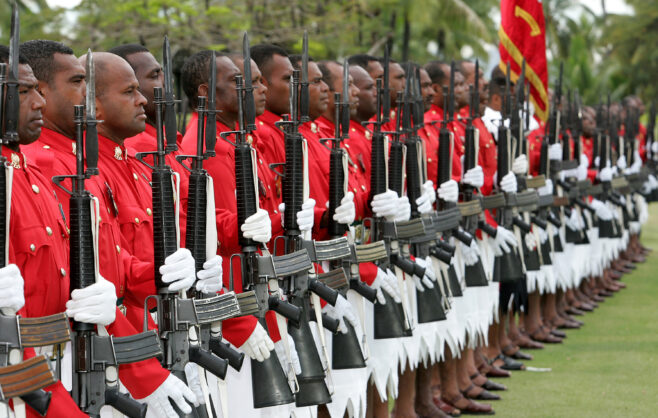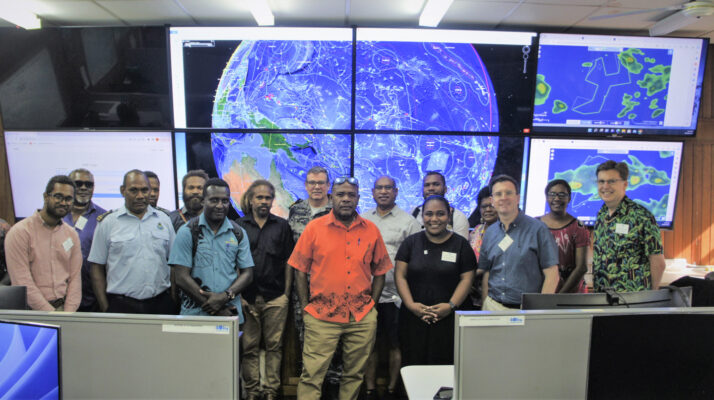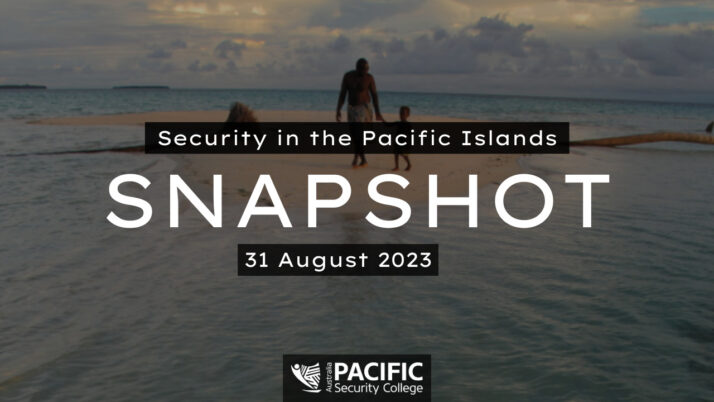Strategies for a safer Pacific: can national security strategies make the region more secure?

Fijian soldiers, wearing sulus (serrated sarongs) and sandals, form a guard of honour during the opening ceremony for the 37th Pacific Islands Forum meeting on Denarau Island in Fiji, 24 October 2006. The forum’s official business was overshadowed by a dispute between Australia and its neighbours Papua New Guinea and the Solomon Islands. (Photo by Torsten Blackwood / AFP)
National security strategies will make the Pacific safer, provided they are realistic, the product of widespread consultation, embedded in the local culture, and effectively implemented, Tim George writes.
The development of national security strategies is now firmly on the Pacific regional agenda. Four countries have completed such strategies – Papua New Guinea (2013), Samoa (2018), Vanuatu (2019), and Solomon Islands (2020) – while a number of others are well advanced.
The region has been quick to adopt an expanded concept of security – articulated by Pacific Island Forum leaders in the 2018 Boe Declaration on Regional Security – which extends well beyond traditional notions of security such as sovereignty, territorial integrity, and the maintenance of internal stability. There is widespread recognition of the gravity of global threats posed by ‘problems without borders’, such as climate change, the spread of infectious diseases, and cyber-attacks, and that human security and a just society are fundamental to national security.
Typically, a national security strategy provides an overarching framework which includes a vision and objectives for national security and a series of other elements, including an outline of the national, regional and global security environment, and an outline of the capabilities needed to meet challenges and maximise opportunities.
There is no one template that can be applied across the region. Nevertheless the countries of the region by and large face many of the same challenges. So it makes sense for them to work together, particularly given that most are small, with limited resources. The region has shown it can have a strong voice globally on certain issues, such as climate change, and also has a strong network of regional organisations and development partners to draw on. These strengths should be highlighted in national security strategies.
These strategies outline an action plan for specific initiatives, a more general statement of directions the government proposes to take to reinforce national security over the short and long term, and a describes the government machinery and other proposed measures to implement the strategy.
When designed effectively, national security strategies make Pacific states more secure because they provide a clear direction for the nation’s security efforts. Primarily, a well designed and implemented strategy allows Pacific countries to better prioritise security threats and allocate resources. This has knock-on effects of allowing countries to make better security decisions, especially in times of crisis, and to collect more specific and relevant data regarding current and future threats.
A widespread problem in the region is poor collaboration and information-sharing between government agencies on national security issues, and more generally the absence of a deep-rooted whole-of-government culture. These are issues that national security strategies can begin to address.
Effective national security strategy development requires both a strong whole-of-government focus and a comprehensive program of consultations with the public, private and community sectors. Wide consultation is essential to gain a full understanding of the most pressing security issues across the nation, strengthen national ownership of the strategy, raise awareness, and take full advantage of the strong role played by traditional institutions in maintaining social cohesion, security and harmony.
In many cases the most important outcome of a national security strategy developed by Pacific Island nations will be the implementation measures, notably those dealing with new or strengthened government machinery. Most nations of the region currently have only a very modest national security system, or none at all, and only few personnel specifically assigned to cover national security issues.
The key element of new government machinery is likely to be a senior-level national security committee or council, with the authority to take decisions and make recommendations to cabinet. An example of such a structure is Samoa’s National Security Committee, which was first proposed in 2018. The essential requirement is that all relevant agencies be represented on such a body in order to ensure that all voices are heard and prevent inefficiencies created by a lack of coordination and a duplication of efforts.
Another important element of a national security strategy concerns the nation’s assessment capability, essential for sound decision-making on national and regional security issues. Overall the region is weak in this regard.
More generally, the lack of good quality data is a widespread problem in the region. Now is the time to boost national assessment capabilities, drawing on the growing amount of information and analysis available from open sources, as well as from regional organisations and trusted bilateral partners.
Forum leaders took the far-sighted step in 2018 of embracing the concept of national security strategies, and the COVID-19 crisis has reinforced the importance of sound-decision making more generally as nations face the plethora of security challenges ahead. National security strategies, if effectively implemented, will be a major boost to governments in dealing with the tough decisions which are becoming all too common in a growingly complex world.
Tim George
More Stories

Latest News - 4 Oct 2023
Regional and National Security Architecture in the Blue Pacific, Honiara, Solomon Islands
Former deputy secretary of the Pacific Islands Forum Mr Peter Forau, and CEO of Solomon Islands Broadcasting Corporation and former adviser to the Pacific Islands Forum Johnson Honimae join the Pacific Security College’s workshop on Regional and National Security Architecture in the Blue Pacific The recently concluded Regional and National Security Architecture in the…

Security Snapshot - 31 Aug 2023
Pacific Security Snapshot | 31 August 2023
The security stories shaping the region ➣ Joint Heads of Pacific Security Meeting in Palau ➣ Melanesian Spearhead Group Leaders’ Summit in Vanuatu ➣ Cook Islands launches National Security Policy ➣ Aotearoa New Zealand releases National Security Strategy ➣ Japan begins release of treated nuclear wastewater into Pacific Ocean Regionalism The 5th Joint Heads of…






